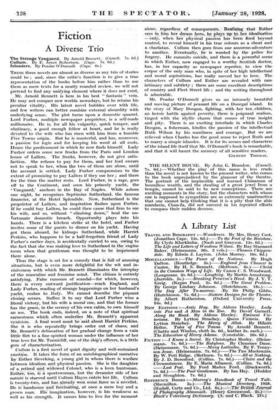Fiction
A Diverse Trio
Islanders. By Peadar O'Donnell. (Cape. 6s.) THESE three novels are almost as diverse as any trio of stories could be ; and, since the critic's function is to give a true representation of the books before him rather than to use them as mere texts for a neatly rounded review, we will not pretend to find any unifying element where it does not exist, Mr. Arnold Bennett is here in his best " fantasia " vein. He may not conquer new worlds nowadays, but he retains his peculiar vitality. His latest novel bubbles over with life, and few writers can better combine external absurdity with underlying sense. The plot turns upon a domestic quarrel. Lord Furber, multiple newspaper proprietor, is a .self-made millionaire. He is, for all his vulgarity, quick temper; and obstinacy, a good enough fellow at- heart, and he is- really devoted to the wife who has risen with him from a humble Five Towns origin. But he is masterful, and has, moreover, a passion for logic and for keeping his word at all costs. Hence the predicament in which he now finds himself. Lady Furber orders some new frocks from the Paris and London house of ',idlers. The . frocks, however, do not give satis- faction. She refuses to pay for them, and her lord swears not to speak to her, when the two of them are alone, until the account is settled. Lady Furber compromises to the extent of promising to pay Lallers if they sue her ; and there for the time the matter rests. Lord Furber, in a rage, goes off to the Continent, and soon his princely yacht, the ' Vanguard,' anchors in the Bay of Naples, While ashore one night, he recognizes. Septimius Sutherland, the famous financier, at the Hotel Splendide. Now, Sutherland is the proprietor of Lallers, and inspiration flashes upon Furber. If he could buy L011ers, he could then cause that firm to sue his wife, and so, without " climbing down," heal the un- fortunate domestic breach. Opportunity plays into his hands. There is a kitchen strike at the hotel, and Furber invites some of the gueSts to dinner on his yacht. Having got ` them aboard, :he kidnaps Sutherland, while Harriet Perkins, who happens to be a half-forgotten friend of Lady Furber's earlier days, is accidentally carried to sea, owing to the fact that she was making love to Sutheriand in the engine room when that gentleinan was thought to be imprisoned there alone.
Thus the stage is set for a comedy that is fUll of amusing situations, but is even more delightful for the wit and in- cisiveness with which Mr. Bennett- illuminates the interplay of the niasetiline and feminine mind. The cliinax is entirely satisfying. False rumours of scandal-for which, however, there is every outward justification-reach England, and Lady Furber, reading of strange happenings on her husband's yacht, rushes to , Italy.. We cannot describe the piquant closing scenes. Suffice it to say that Lord Furber wins a literal victory; but his wife a moral 'one, and that the former has the grace, in the secrecy of his own cabin, to own himself an ass. The book ends, indeed, on a note of that spiritual earnestness which often underlies Mr. Bennett's apparent cynicism. 'A final word must be said abont Harriet Perkins. She it is who repeatedly brings order out of chaos, and Mr. Bennett's delineation of her gradual change from a vain little flirt to a fine-spirited woman under the influence of her true love for Mr. Tunnicliff, one of the ship's officers, is a" little gern of characterization. Cullain is a first novel of quiet dignity and well-restrained eineki6n. It takes the form of an autobiographical narrative
by Esther Sieveking, a young girl in whom there is warfare between idealism and physical passion. She is the daughter of a retired and Widolved Colonel, who is a keen huntsman.
Esther; tOO, is a sportiwOman, but the dreamier side of her nature is'starved until Cullum Hayes enters her life. Cullum IS twenty-two, and has already won some-fame as 'n novelist: He is handsome 'and -faSeintitilig, at once a mere boy and a grown man: His imagination, however, is his weakness as well as his strength. It causes him-to live -for the Moment alone,- regardless of consequences. Realizing that Esther sees in him her dream hero, he slays- tip tO her idealization -only, when her physical passion has 13Cen fired beyond control, to reveal himself in his true colours as a cheat and a charlatan. Cullum then goes from one amorous adventure to another. EVentually, he is wanted by the police for forgery. He commits suicide, and there is a powerful scene in which Esther, now engaged to a worthy Scottish doctor, has, in her capacity as newspaper reporter, to view the corpse of the only man who, in spite of her high intellectual and moral aspirations, has really moved her to love. The characters of Cullum and Esther are revealed with rare intimacy and subtlety ; there are some excellent descriptions of country and Fleet Street life ; and the writing throughout is admirable.
Mr. Peadar O'Donnell gives us an intensely beautiful and moving picture of peasant life on a Donegal island. In the story of Mary Doogan, fighting, with• her ten: children, an -heroic battle against poverty, there is poignant realism, tinged with the idyllic charm that comes of true insight and pity. There is an exciting interlude in which Charles Doogan, a fisherman, kindles the passion of the intellectual Ruth Wilson by his manliness and courage. But we are relieved when Charles has the good sense to reject Ruth and to marry a simple islander. It is for its scenes and characters of the island life itself that Mr. O'Donnell's book is remarkable, and that it will haunt the memory of all sensitive readers.
GILBERT THOMAS.










































 Previous page
Previous page